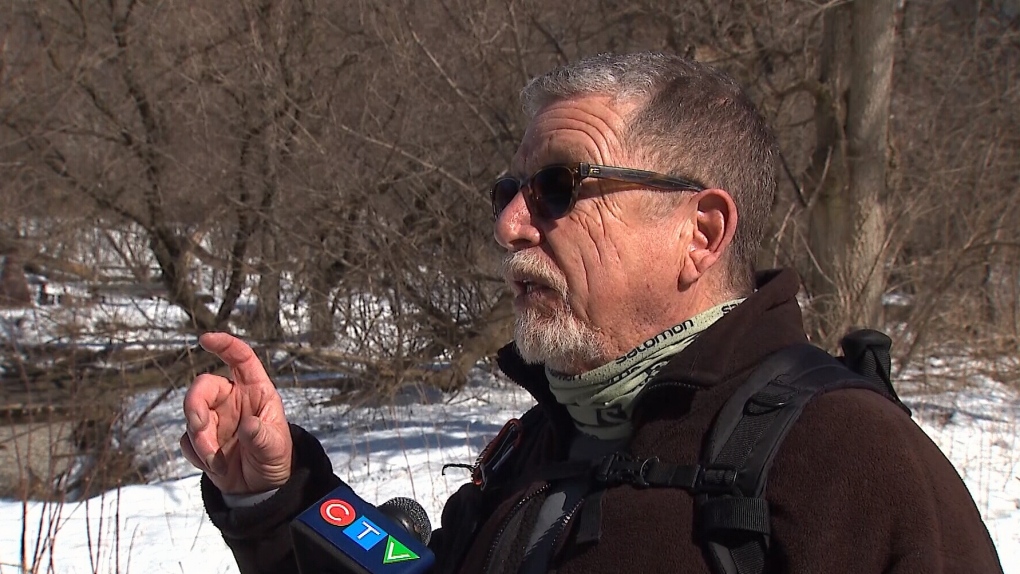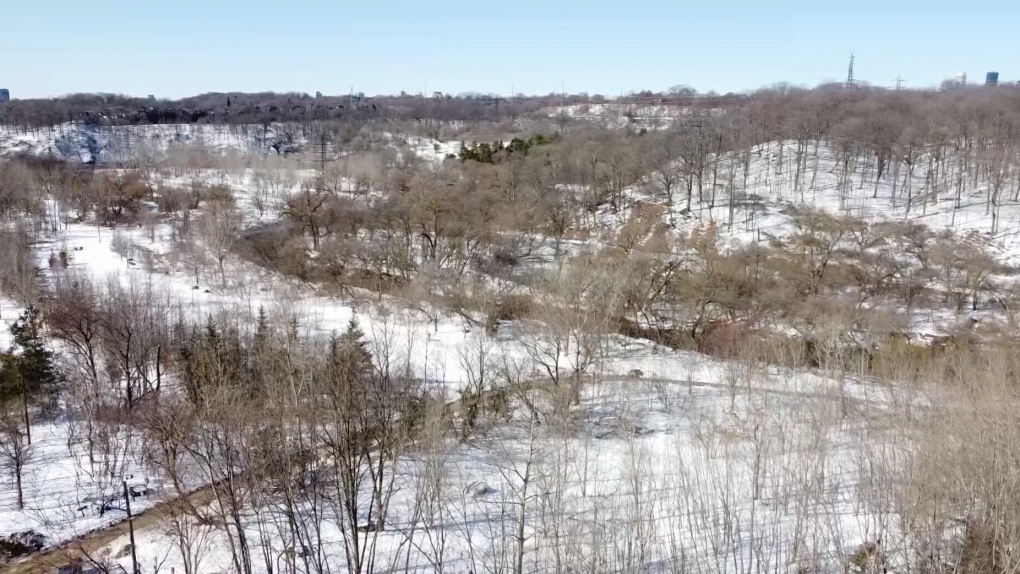Environmental groups shocked after Metrolinx announces plan to chop 2,800 trees in the Don Valley
 Floyd Ruskin of A Park for All says Metrolinx has plenty of time to consult with the community and reevaluate its plan to chop down 2,800 trees in the Don Valley before construction begins on the future Ontario Line.
Floyd Ruskin of A Park for All says Metrolinx has plenty of time to consult with the community and reevaluate its plan to chop down 2,800 trees in the Don Valley before construction begins on the future Ontario Line.
Metrolinx has confirmed plans to begin cutting down upwards of 3,000 trees in the Don Valley this month as part of Ontario Line construction, a move that some environmental groups say undermines their efforts to protect the expansive urban ravine.
Less than a week ago, the province’s transit agency announced would begin the phased removal of 2,787 trees at three sites, Don Valley crossing, Walmsley Brook crossing, West Don crossing, which are along the route of the future subway line’s Thorncliffe Park and Flemingdon Park stations. Of the roughly 2,800 trees slated for removal, 456 are invasive and 229 are pest or disease-prone, Metrolinx said in its March 2 notice.
Tree cutting is set to begin on Friday.
“The amount of trees, the size of those boxes, and how many trees they are planning to cut was a shock,” Floyd Ruskin with A Park for All told CP24.com late Tuesday afternoon.
Ruskin, who noted that it will take roughly 50 years to restore the lost ecosystem, said it was always understood that trees would have to be removed in the Don Valley for transit expansion, but that the scope of what that would entail wasn’t revealed until recently and without community consultation.
He also wonders what’s the rush as Metrolinx has said that actual construction on that portion of the new 15.6-kilometre line isn’t slated to get underway until late 2024 or even early 2025.
“We do have time to control the amount of trees lost,” said Ruskin, adding he’s optimistic that the number of trees felled could be brought down to 1,500 or even 2,000.
“I don’t think that’s unreasonable, especially when there’s time.”
Ruskin also said that the "disregard" Metrolinx has for communities is troubling.
"Let's have some transparency. Let's have some open consultation. And maybe we can minimize the impact of a building transit and building transit better," he said.
Tom Connell of Build the Park described the disruption to the urban parkland caused by the loss of nearly 2,800 trees in the Don Valley as “distressing.”
He also said there’s no way to know that Metrolinx is really making the full effort to minimize the impacts of this latest tree-cutting plan on the valley based on their lack of transparency in sharing plans with the community.
“They represent an approach to transit development that suits them. But is it really completely consultative? Is it working closely with other levels of government that many policy priorities served by the parkland in the Don Valley?” he said.
Connell is also calling for a vision for the lower Don Valley as he expects more encroachments will come down the line as the city grows.
“There's many, many ideas that have been put forward for the lower Don and I think Metrolinx has an important role to play in bringing those to fruition,” he said.
“I think there's hesitation in completely leaving it up to (Metrolinx). We just don't know what we're gonna get. I think the more pressure that can be brought to bear on very expensive remediation, compensation and so on, the better.”
Connell said he wants “constant consultation” with stakeholders to be a central part from the get-go.”
“It'd be really nice to see more balanced partnership really pointing or fulfilling a shared vision for the valley,” he said, adding under current provincial legislation the transit agency has a lot of leeway and has no obligation to do so.
 Upwards of 3,000 trees are set to be cut down in the Don Valley to make way for the new Ontario Line.
Upwards of 3,000 trees are set to be cut down in the Don Valley to make way for the new Ontario Line.
Metrolinx, in a statement provided to CP24.com and CTV News Toronto, said removing almost 2,800 trees in the Don Valley is “critical to bring much-needed subway service to communities underserved by transit like Thorncliffe Park and Flemingdon Park.”
“The Ontario Line will see almost 400,000 passengers every day, reduce crowding on existing buses, streetcars and subways, and put nearly 50,000 more jobs within easy reach of transit,” the agency said.
“We strive to minimize construction footprints and impacts on green spaces when building new transit. When trees do need to come down, we plant 1 to 50 new trees based on the size and location of the tree being removed.”
Metrolinx said on average, its practice is to plant at least three trees for every tree removed for transit expansion, adding they’d work with the City of Toronto to align restoration work with its Ravine Strategy.
The city, meanwhile, said it is a “key stakeholder” in Metrolinx’s plan to deliver the Ontario Line and appreciates the “vital need for transit expansion,” however the needs of the local community and Toronto’s natural environment must also be taken into consideration.
“(We are) aware of the local community's desire to protect parkland and recreational spaces and is committed to working with Metrolinx to mitigate construction impacts wherever possible,” the City of Toronto wrote in a statement.
The city went on to say that the construction of the Ontario Line in the Don Valley will take place within lands with various ownership, including Hydro One, TRCA, the city, and Metrolinx.
It noted that any affected lands under their ownership or maintenance have been licenced to the provincial transit agency to complete this work.
“The City issued permits for tree removal and Metrolinx is expected to restore areas impacted by construction within the Ravine and Natural Feature Protection limits to a naturalized condition, including replanting trees, following construction completion. Where tree planting cannot be accommodated on site, alternative locations in proximity to the project will be assessed,” it said.
Coun. Paula Fletcher said there’s no question that everyone wants more transit in the GTA, but getting there in a “very built-up, dense area” isn’t easy and is more successful when the local stakeholders are involved in the process from Day One.
The Toronto-Danforth councillor said that hasn’t been the case with Metrolinx pointing to a number of affected areas in her ward, including Small’s Creek and in Leslieville-Riverside, where the existing rail corridor is set to be expanded from three to six tracks for the new Ontario line as well as the expansion of the regional GO Train system.
“I think most people just don’t have a lot of faith in their decision making,” she told CP24 Tuesday afternoon.
“If people trusted Metrolinx more (cutting down these trees in the Don Valley) might not be such an issue.”
Fletcher said the province has essentially given Metrolinx the right to do as it wants when it comes to transit expansion without the need for any permits from the city.
She said this carte blanche has meant that the agency hasn’t had the need or expectation to explore alternative, less impactful options for its projects.
“Nobody is convinced they always make the right decisions. It’s a big, big credibility issue,” Fletcher said.
The area’s MPP, Peter Tabuns, also agreed that getting more transit built is critical for the city, but said it needs to be done right.
“Metrolinx would have better-served transit and the Don Valley if it had engaged in a more detailed consultation with the public,” Tabuns, who represents Toronto –Danforth and serves as the NDP’s critic for Energy and Climate Crisis, said in a statement provided to CP24.com.
“We recently saw Metrolinx abandon plans for a GO Transit railyard in the Don Valley in favour of a site in a light industrial area; it’s clear that with thoughtful community consultation, we can find solutions that serve our need for expanded transit while minimizing environmental damage.”
Metrolinx’s latest tree removal announcement comes just weeks after the courts ruled in the transit agency’s favour to allow the removal of 11 trees at Osgoode Hall for another Ontario Line station amid numerous objections from the community as well as the Law Society of Ontario.
Last month, the agency also raised the ire of downtown east residents after axing 61 trees in Moss Park to also make way for future stations on the same line.
The Ontario Line, which will run from Exhibition Place up to the Ontario Science Centre, is expected to be completed in 2031.
CTVNews.ca Top Stories

Can the Governor General do what Pierre Poilievre is asking? This expert says no
A historically difficult week for Prime Minister Justin Trudeau and his Liberal government ended with a renewed push from Conservative Leader Pierre Poilievre to topple this government – this time in the form a letter to the Governor General.
'I'm still thinking pinch me': lost puppy reunited with family after five years
After almost five years of searching and never giving up hope, the Tuffin family received the best Christmas gift they could have hoped for: being reunited with their long-lost puppy.
Wrongfully convicted N.B. man has mixed feelings since exoneration
Robert Mailman, 76, was exonerated on Jan. 4 of a 1983 murder for which he and his friend Walter Gillespie served lengthy prison terms.
Pickup truck driver killed by police after driving through Texas mall and injuring 5
A pickup truck driver fleeing police careened through the doors of a JCPenney store in Texas and continued through a busy mall, injuring five people before he was fatally shot by officers, authorities said.
Unifor members ratify new agreement with Canadian National Railway
Unifor said on Sunday that its members at Canadian National Railway (CN Rail) have ratified a new four-year collective agreement, averting a potential strike action.
BREAKING NEWS 6 adults, 4 children taken to hospital following suspected carbon monoxide exposure in Vanier
The Ottawa Paramedic Service says ten people were taken to hospital, one of them in life-threatening condition, following an incident of suspected carbon monoxide exposure Sunday morning in the neighbourhood of Vanier.
Two U.S. Navy pilots shot down over Red Sea in apparent 'friendly fire' incident, U.S. military says
Two U.S. Navy pilots were shot down Sunday over the Red Sea in an apparent 'friendly fire' incident, the U.S military said, marking the most serious incident to threaten troops in over a year of America targeting Yemen's Houthi rebels.
Big splash: Halifax mermaid waves goodbye after 16 years
Halifax's Raina the Mermaid is closing her business after 16 years in the Maritimes.
Second body recovered from site of B.C. landslide
The second resident of a home that was destroyed by a landslide in Lions Bay, B.C., last weekend was found dead Saturday, officials confirmed.
































